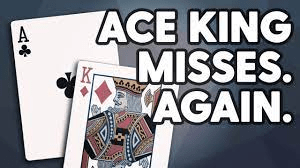
Many poker players consider A/K to be a powerful and adrenaline-inducing hand, especially when it is suited. Some players are willing to risk all their chips on A/K, while others fold it when faced with a large pre-flop raise. To effectively play A/K, one needs to have a good understanding of poker math. This includes knowing the probabilities and how to navigate different situations that may arise. In this article, I will present the math behind playing A/K instead of offering advice on how to play it.
Having the skill to read the board accurately is crucial in every poker hand, but it’s particularly vital when holding A/K. Though there are some “made” hands that are easy to play, A/K is not one of them, even if some players tend to treat it that way. What do you do post-flop when you miss the board entirely, which happens about two-thirds of the time? In this article, we will examine the probabilities associated with A/K, both suited and unsuited, and discuss strategies to increase your chances of winning.
It’s important to remember that Ace-King (A/K) is a tricky hand to play in poker, even though some may argue that it’s the fourth-best hand in Hold’em (after pocket Aces, Kings, and Queens). While playing A/K, making the right decisions and maximizing your profit can be challenging. According to the math, A/K is statistically less likely to win against random opponents than any pocket pair greater than sixes.
Ace/King Off Suit Flop Probabilities

The probability of being dealt A/K off suit is 0.90% or expressed as odds 110 to 1.
Flopping a pair is the most likely scenario: one Ace or one King, which is 32.4% or 2.08 to 1.
Flopping two pair – exactly one Ace and one King – 2.02% or 48.5 to 1.
What about that straight – which, of course, is a one-way street, as it must be exactly Ten, Jack, Queen. Well, there is a 3% – 32.33 to 1 -chance of making a straight, pre-flop to the river. If you have aspirations of flopping a straight, those probabilities are 0.3265% or 305 to 1.
AA or KK on the flop – 0.6745% or 147 to 1.
AAK or KKA on the flop – 0.0459 or 217 to 1.
AAA or KKK on the flop – 0.0051% or 1,960 to 1.
The total probability of getting something “good” on the flop is 32.75% or 2.05 to 1 – not bad!
The Math of Ace/King Suited

Of course, with Ace/King Suited, you have the same probabilities as described above, along with the nut flush draw.
Flopping the flush – the probabilities are 0.82% or 122 to 1. Flopping a flush-draw 10.94% or 8.14 to 1. The probability of completing the flush draw, turn, and river is 35% – 1.86 to 1 odds.
The probability of getting something “good” on the flop is 43.69% or 1.29 to 1 – assuming you want to include the flopped flush draw of 10.94%, meaning you will miss the flush nearly 2 out of 3 times.
Let’s say you have a flush draw, meaning you flopped two cards of your suit. You now have a 35% chance or 1.86 to 1 odds of making your hand. Additionally, you could still hit an Ace or King, potentially winning with the top pair. So, you have 15 outs – 9 of your suit, 3 Aces, and 3 Kings. Having 15 outs gives you a 31.91% or 2.1 to 1 chance on the turn. If you miss the turn, you have roughly the same probabilities on the river as the turn. This gives you a combined 54.12% – .08 to 1 chance on turn and river combined.
Considering factors like board texture, opponents’ aggressiveness, and number of players in hand, the cost of seeing both cards can vary. Being capable of calculating your pot odds versus the odds of competing your hand is now crucial.
The Importance Of Post-Flop Strategy

Having a well-thought-out post-flop strategy for A/K is crucial in poker. After the flop, assessing your opponents’ playing styles and the board texture is important to decide on your next move. If the flop cards don’t work in favor of most of your opponents, it may be a good time to make a continuation bet and potentially win the pot right away. However, if the board is coordinated and the math is not in your favor, it may be wise to consider a check instead.
Since poker is situational, there is no fixed strategy for playing A/K after the flop. It depends on various factors, such as your opponents’ playing styles, the cards on the board, your table image, and countless other factors. Therefore, it’s vital to evaluate the situation carefully before making any decisions.
